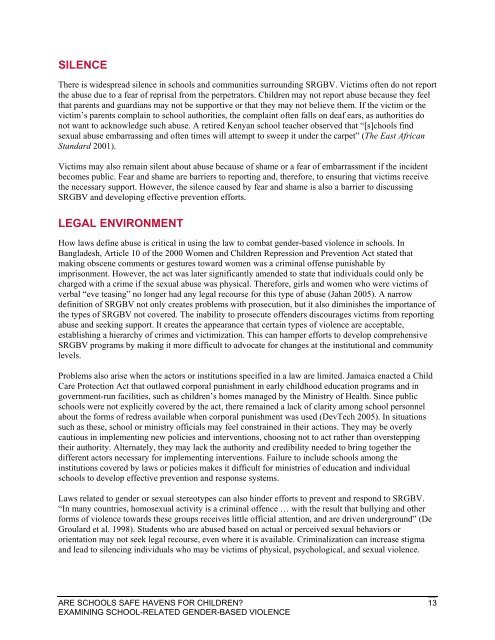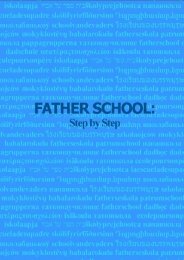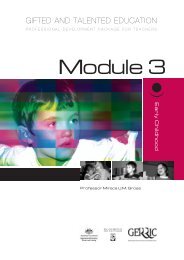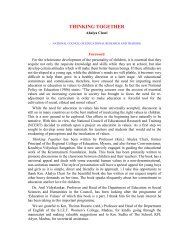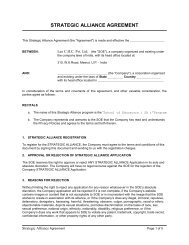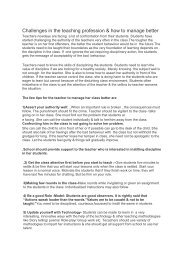ARE SCHOOLS SAFE HAVENS FOR CHILDREN?
ARE SCHOOLS SAFE HAVENS FOR CHILDREN?
ARE SCHOOLS SAFE HAVENS FOR CHILDREN?
Create successful ePaper yourself
Turn your PDF publications into a flip-book with our unique Google optimized e-Paper software.
SILENCEThere is widespread silence in schools and communities surrounding SRGBV. Victims often do not reportthe abuse due to a fear of reprisal from the perpetrators. Children may not report abuse because they feelthat parents and guardians may not be supportive or that they may not believe them. If the victim or thevictim’s parents complain to school authorities, the complaint often falls on deaf ears, as authorities donot want to acknowledge such abuse. A retired Kenyan school teacher observed that “[s]chools findsexual abuse embarrassing and often times will attempt to sweep it under the carpet” (The East AfricanStandard 2001).Victims may also remain silent about abuse because of shame or a fear of embarrassment if the incidentbecomes public. Fear and shame are barriers to reporting and, therefore, to ensuring that victims receivethe necessary support. However, the silence caused by fear and shame is also a barrier to discussingSRGBV and developing effective prevention efforts.LEGAL ENVIRONMENTHow laws define abuse is critical in using the law to combat gender-based violence in schools. InBangladesh, Article 10 of the 2000 Women and Children Repression and Prevention Act stated thatmaking obscene comments or gestures toward women was a criminal offense punishable byimprisonment. However, the act was later significantly amended to state that individuals could only becharged with a crime if the sexual abuse was physical. Therefore, girls and women who were victims ofverbal “eve teasing” no longer had any legal recourse for this type of abuse (Jahan 2005). A narrowdefinition of SRGBV not only creates problems with prosecution, but it also diminishes the importance ofthe types of SRGBV not covered. The inability to prosecute offenders discourages victims from reportingabuse and seeking support. It creates the appearance that certain types of violence are acceptable,establishing a hierarchy of crimes and victimization. This can hamper efforts to develop comprehensiveSRGBV programs by making it more difficult to advocate for changes at the institutional and communitylevels.Problems also arise when the actors or institutions specified in a law are limited. Jamaica enacted a ChildCare Protection Act that outlawed corporal punishment in early childhood education programs and ingovernment-run facilities, such as children’s homes managed by the Ministry of Health. Since publicschools were not explicitly covered by the act, there remained a lack of clarity among school personnelabout the forms of redress available when corporal punishment was used (DevTech 2005). In situationssuch as these, school or ministry officials may feel constrained in their actions. They may be overlycautious in implementing new policies and interventions, choosing not to act rather than oversteppingtheir authority. Alternately, they may lack the authority and credibility needed to bring together thedifferent actors necessary for implementing interventions. Failure to include schools among theinstitutions covered by laws or policies makes it difficult for ministries of education and individualschools to develop effective prevention and response systems.Laws related to gender or sexual stereotypes can also hinder efforts to prevent and respond to SRGBV.“In many countries, homosexual activity is a criminal offence … with the result that bullying and otherforms of violence towards these groups receives little official attention, and are driven underground” (DeGroulard et al. 1998). Students who are abused based on actual or perceived sexual behaviors ororientation may not seek legal recourse, even where it is available. Criminalization can increase stigmaand lead to silencing individuals who may be victims of physical, psychological, and sexual violence.<strong>ARE</strong> <strong>SCHOOLS</strong> <strong>SAFE</strong> <strong>HAVENS</strong> <strong>FOR</strong> <strong>CHILDREN</strong>?EXAMINING SCHOOL-RELATED GENDER-BASED VIOLENCE13


